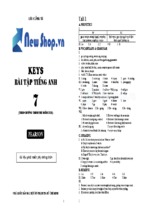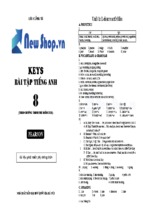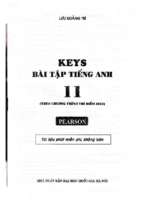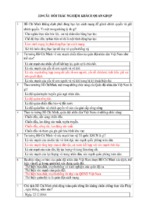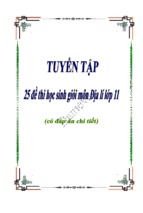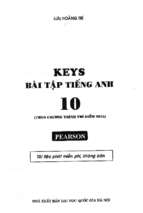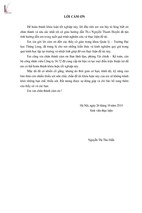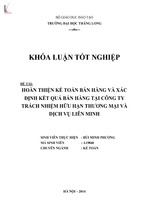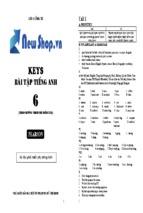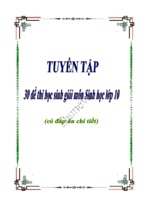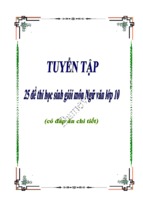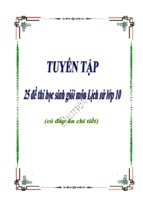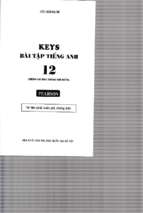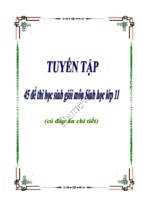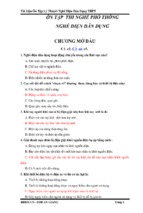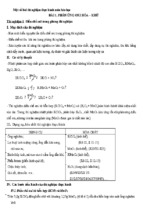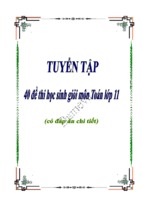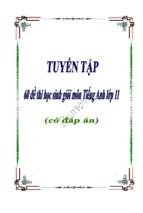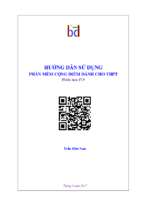LÖU HOAÈNG TRÍ
Unit 1: Leisure activities
A. PHONETICS
I.
/pr/
/br/
Brian, broth, branch, toothbrush,
apricot, presentation, prepare, prevention, programme,
brother, browsing
pronunciation, precious, private, project,
II.
1. principal
2. present
3. bridge
4. brick
5. breakfast
6. price
7. branch
8. Prince
9. bracelet
10. prize
B. VOCABULARY & GRAMMAR
KEYS
BAØI TAÄP TIEÁNG ANH
8
(THEO CHÖÔNG TRÌNH THÍ ÑIEÅM 2015)
PEARSON
Taøi lieäu phaùt mieãn phí, khoâng baùn
I.
1. read: a newspaper, a magazine, an e-mail
2. go: swimming, shopping, hiking
3. play : football, the guitar, computer games
4. write : a letter, an e-mail, something interesting
5. listen to : the radio, music, CDs
6. watch : television, a video, a game show, a quiz show
7. go to: school, the cinema, a restaurant, the library
8. visit: friends, cousins
9. do : nothing, something interesting
10. have : a meal, leisure activities, an outdoor activity
II.
1. about = abt
2. and = n
3. are = r
4. at = @
5. for = 4
6. great = gr8
7. kisses = xx
8. by the way = btw
9. love = luv
10. you = u
11. see you = c u
12. thanks = thx
13. to/two = 2
14. would = wd
15. your = ur
16. tomorrow = 2moro
III.
2
A. Hi, Katy! Thx 4 ur text … Yes, wd u love 2 meet 2moro? c u @ Roebuck’s abt 5?
A. Hi, Katy! Thanks for your text … Yes, would you love to meet tomorrow? See you
at Roebuck’s about 5?
4
B. Fantastic!!! What is it? r u in luv.
B. Fantastic!!! What is it? Are you in love?
3
C. That’s gr8, c u @ 5 btw … I’ve got some important news 4 u …
C. That’s great, see you at 5. By the way, I’ve got some important news for you.
1
D. Hi Sue! … Joe n I will be in town 2moro. wd u like 2 meet 4 a coffee? Luv Katy
D. Hi Sue! … Joe and I will be in town tomorrow. Would you like to meet for a
coffee? Love Katy
5
E. Tell u 2moro Love n xx Katy
E. Tell you tomorrow. Love and kisses Katy
2. watching
3. skiing 4. doing 5. swimming
6. going
IV. 1. playing
V.
1. don’t like watching 2. hate standing
3. getting
4. prefer to be
5. don’t mind playing 6. Does he like playing 7. prefers to play
8. likes scoring
9. doesn't mind watching
C. SPEAKING
NHAØ XUAÁT BAÛN ÑAÏI HOÏC QUOÁC GIA HAØ NOÄI
I. 1. like
6. And you
2 - Löu Hoaèng Trí
2. o’clock
7. do
3. take
8. joke
4. afternoon
5. likes
II. 1. a good place 2. somewhere different
3. Why don’t 4. lots to see 5. come back
D. READING
I. 1. 87 2. 42
3. 82
4. 10
5. 23
6. 38
7. 30
8. 32
II.
1. He goes to the cinema.
2. He plays football on Saturday morning.
3. He watches TV (usually a football match).
4. He does his homework.
5. He surfs the Net on Friday afternoon and Sunday evening.
III.
1. Skateboarding became very popular in the 1970s.
2. They are ‘freestyle’ skateboarding, ‘ramp’ skateboarding, and ‘street-style’ skateboarding.
3. It is a combination of freestyle and ramp skateboarding.
4. Because this allowed them to skateboard safely.
5. Yes, I do. Because there are lots of competitions now.
IV.
1. In the UK they play football, rugby, tennis and basketball, while in the USA they play
American football, athletics, basketball and baseball.
2. They spend over 25 hours a week online.
3. The average teenager in the UK gets about £7 a week pocket money. In the USA it is
about $10.
4. They spend their money on clothes and going out, but magazines, presents and snacks
are also important.
5. They have sixteen online friends.
V. 1. C 2. E
3. B
4. D
5. A
E. WRITING
I. 1. G 2. I
3. C
4. E
5. A
6. J
7. B
8. H
9. D 10. F
II. There are both many good things and many potential dangers about social media. It is
important for parents to teach their children how to use social media wisely. Social media
can be the start of bad things like cyberbullying… The recent reports about the matter say
that many teenagers have online contact with strangers, and it makes them feel scared or
uncomfortable. Others have received online advertising that was inappropriate for their age.
It is important for parents to be aware of what their children are doing online. Parents should
make their children understand that they respect their children’s privacy. However, parents
want to make sure (that) their children are safe.
TEST (UNIT 1)
I. 1. B 2. C
3. D
4. A
5. C
II.
6. brown
7. break
8. bread
9. broken
11. pretty
12. prize
13. Broccoli 14. practice
III.
16. use
17. play
18. play
19. go
21. go
22. listen to
23. watch
24. listen to
26. play
27. watch/listen to
IV. 28. Hi, Alex. r u free 2moro? wd u like 2 go 2 c a film? Luv Ed
29. OK.What wd u like 2 c?
30. How abt “The Queen n I”? It’s @ the Odeon @ 7.30 p.m.
10. bring
15. prepositions
20. go out
25. go
Baøi taäp Tieáng Anh 8 - 3
31. gr8 … What time?
32. abt 7.15?
33. c u there. btw I haven’t got any money … Can u pay for my ticket?
34. I’ll lend u the money.
35. thx for that! c u 2moro.
Luv n xx, Alex
V.
36. enjoy doing
37. doesn’t mind helping
38. plays
39. goes skateboarding
40. prefers to play 41. do
42. does
43. doesn’t like getting
VI. 44. D 45. A 46. F
47. C
48. B
VII. 49. C 50. B 51. A
52. D
53. F
54. E
VIII. 55. T
56. F
57. T
58. F
59. F
60. F
61. T
62. T
IX. 63. C 64. D 65. B
66. E
67. A
68. G
69. H
70. J
71. F 72. I
X.
73. First
74. Second
75. In my opinion
76. also
77. Besides
78. In addition
79. Finally
80. In short
Unit 2: Life in the countryside
A. PHONETICS
/bl/
black, blue, blow, blouse, block, blame,
blank, blossom, blind, blink(ed)
/kl/
clothing, club, class, classical, clean, clear,
clever, climb(ing), clerk, close
B. VOCABULARY & GRAMMAR
I.
1. ride: a camel, a bike, a motorbike, a donkey, a car, an ostrich
2. collect: food, water, data, information, dolls, postcards
3. pick: grapes, blackberry, strawberry, tea buds,
4. herd: buffaloes, cattle, goats, sheep
5. put up: a flag, a fence, a memorial, a notice
II. 1. F 2. E
3. I
4. H
5. C
6. B
7. J
8. G
9. A 10. D
III.
1. kites
2. vast
3. ride
4. dry
5. loaded
6. harvest
7. grassland
8. beehive
9. convenient
10. cattle
IV.
1. peaceful
2. nomadic
3. collector
4. inconvenient
5. unsafe
6. friendly
7. healthily
8. traditional
9. generously
10. soundly
V.
1. bigger than 2. hotter than 3. more expensive than 4. bigger than
5. more intelligent than
6. more important than 7. cheaper than
8. harder than
9. better than 10. worse than
VI.
1. cheaper than 2. more effective than 3. more beautiful than 4. taller than
5. heavier than 6. longer than
7. easier than
8. easier than
9. more comfortable than
10. more interesting than
VII.
1. I work faster than Tom (does).
4 - Löu Hoaèng Trí
2.
3.
4.
5.
Mai sings more beautifully than Mi (does).
We arrived at the party more early than the Smiths (did) last night.
Phong speaks more loudly than Nick (does).
I speak English more fluently than my sister (does).
C. SPEAKING
Advantages: 3, 4, 5, 6
Disadvantages: 1, 2, 7, 8
D. READING
I. 1. C 2. B
3. A
II. 1. more
2. for
6. in
7. each
4. D
5. C
3. there 4. so
8. has
9. be
Unit 3: Peoples of Viet Nam
5. can/may
10. where
A. PHONETICS
/sk/
E. WRITING
I.
1.
2.
3.
4.
5.
6.
II.
1.
2.
3.
4.
5.
XI.
76. Villagers usually earn their living from farming, raising animals, and making handicrafts.
77. They live in a small community with a temple where great events such as festivals are
organized.
78. Villagers in the Southern usually live in houses built on stilts to keep above flood waters.
79. Along the coastal lines, fishermen depend on the sea to live on.
80. People in Central Highlands and the northern regions live by growing rice, rubber trees,
coffee and tea.
Linda lives on a farm in the country, in Colorado, the USA.
In summer, she goes hiking in the mountains.
In winter, she goes snowboarding.
She really likes it because it’s relaxing and quiet.
She thinks city life is not safe enough to walk around alone.
She also thinks it is too dangerous to cycle on the streets because of the heavy traffic.
Soc Trang province has followed the new rural development programme in 22 poor
villages since 2000.
Local people grow rice, vegetables, and raise animals.
Agricultural work becomes less difficult thanks to machinery.
Electricity helps children to study better, and paved roads make transportation easier.
Public works have helped local people especially Khmer people to develop production,
reduce poverty, and create better lives.
TEST (UNIT 2)
I. 1. B 2. B
3. D
4. C
5. D
II. 6. black
7. blue
8. Click
9. blame
10. blood
11. block
12. club
13. clock
14. close
15. clothes
III. 16. colourful 17. inconvenient 18. peaceful 19. brave
20. vast
21. nomadic
22. slow
23. safe
24. quiet
25. hard
IV. 26. collection 27. inconvenient 28. skillful 29. unsafe 30. friendly 31. healthily
V. 32. more heavily 33. harder
34. more brightly
35. more quickly
36. more happily
37. more noisily 38. more easily
39. better
VI. 40. more soundly 41. more healthily 42. more traditionally
43. better
44. more generously 45. more quickly 46. more optimistically
47. more badly
VII. 48. Nick writes essays more carefully than Phuc (does).
49. A snail moves more slowly than a crab (does).
50. My father explained the subject more clearly than my brother (did).
51. My cousin sings better than I do/me.
52. Phong swims faster than Phuc (does).
VIII. 53. F 54. D 55. A
56. G
57. B
58. H
59. E
60. C
IX. 61. D 62. C 63. B
64. A
65. A
66. C
67. D
68. A
69. D 70. B
X. 71. D 72. C 73. B
74. D
75. C
Baøi taäp Tieáng Anh 8 - 5
disconnect, discourage, tasks,
school, ask, discover, skillful
/sp/
spell, speech, spend, sport,
speak, crisp, spicy
/st/
stamp, stone, best, text,
stand, story
B. VOCABULARY & GRAMMAR
I. 1. cultural heritage
2. information
3. ethnic groups
4. research
5. a tour
6. display area
7. stilt house
8. little bridges
II. 1. home 2. dress
3. at
4. with
5. ethnic
6. for
7. valleys 8. provide
9. villages
10. their
III. 1. a 2. the 3. the 4. the 5. the 6. The 7. A
8. a 9. an 10. The
IV. 1. The 2. the3. The 4. The 5. an
6. The 7. The 8. the 9. a 10. a
V.
1. When was the house chosen for the background of the film?
2. Where is the house?
3. What is the film about?
4. Why was she raised by her stepmother?
5. When did she begin to look for her birth mother?
VI.
1. How many inhabitants does the Ha Nhi group have?
2. Where do they live?
3. Who do they (mainly) worship?
4. What do they live on?
5. What do they use to work in the fields?
6. Where are the gardens?
C. SPEAKING
1.
2.
3.
4.
5.
6.
7.
8.
Which language do the Hmong speak?
What do they mainly grow?
Besides that what else do they grow?
What (animals) do the Hmong raise?
What is the most effective source of transportation for the Hmong/ in the mountainous areas?
What is the Hmong handicraft famous for?
When is the Hmong's New Year?
What do villagers play during the New Year's Festival?
D. READING
I. 1. B
2. C
6 - Löu Hoaèng Trí
3. A
4. D
5. C
6. A
7. B
8. D
II.
1. It is located in Duong Lam commune at a 45 km distance from Hanoi.
2. It is the birthplace of two kings in the history of Vietnam, Phung Hung (or Bo Cai Dai
Vuong) and Ngo Quyen.
3. It is typical for villages in the midlands in the North of Vietnam.
4. There are still nearly old 200 houses.
5. Phung Hung Temple, Ngo Quyen Royal Tomb, Mong Phu communal house, Ho Gam
Hill, and the temple at which the diplomat Giang Van Minh is worshiped.
E. WRITING
1.
2.
3.
4.
5.
6.
7.
8.
The Cham ethnic group has a population of about 100,000.
They live mostly on the coast between Ninh Thuan and Binh Thuan provinces, or on
the Cambodian border around Chau Doc.
The Cham have a tradition of wet rice cultivation.
Handicrafts are fairly well-developed, especially silkworm textiles and handmade
pottery wares.
Both men and women wear long one-piece sarongs or cloth wrappers.
The main color of their daily dress is cotton white.
The chief means of transporting goods and farm produce is the back-basket.
The most important festival, called Bon Kate, is held near the Cham towers in the tenth
month of the Lunar year.
TEST (UNIT 3)
I. 1. D 2. B
3. C
4. A
5. B
6. B
7. C
8. C
9. B 10. D
II. 11. speech
12. spend
13. ask
14. sports
15. stone
16. skill
17. spelling
18. speak
19. disk
20. school
21. best
22. stamps
III. 23. mountainous
24. agricultural 25. traditional 26. diversity 27. peaceful
IV. 28. What is the population of the Khmer ethnic group?
29. It is over one million.
30. Where does the Khmer live?
31. They live in Soc Trang, Tra Vinh, Can Tho, Kien Giang, and An Giang provinces.
32. What are their customs?
33. Young Khmer people often go to pagodas to study and improve their virtues and knowledge.
34. What do they do to live on?
35. They live on wet rice cultivation, animal husbandry, weaving, pottery and sugar making
from the “Thot Not” tree.
36. What are their main festivals?
37. They are “Chon Cho Nam Tho May” (New Year Festival), Buddha’s Birthday, “Don
Ta” (Forgive the Crimes of the Dead), and “Ooc Om Bok” (Moon Worship).
V. 38. ethnic minority 39. branch
40. share
41. stilt house
42. marriage
43. musical instruments 44. ceremonies
45. a funeral house
VI.
46. The
47. a
48. The
49. The
50. an
51. the
52. the
53. the
VII. 54. What custom do ethnic groups in Central Highlands have?
55. What do people in the Central Highlands believe?
56. What would the dead do if they were not buried in beautiful graves?
57. What is the purpose of making funeral houses and cutting wooden statues?
58. How many tools do people in the Central Highlands use to make statues?
59. What topics for funeral statues are taken from?
Baøi taäp Tieáng Anh 8 - 7
VIII. 60. B 61. C 62. A
63. D
64. C
65. B
66. A
67. B
68. D 69. B
IX. 70. C 71. A 72. C
73. B
74. D
X. 75. It is quite simple to cook Thang Co.
76. The horse meat and organs are washed and mixed with 12 traditional spices: cardamom,
anise flower, cinnamon, ginger and some secret species…
77. Then all meat and organs are put in a large pan and fried.
78. Wait until the meat becomes dry, and pour water in the pan and simmer within more than
an hour.
79. The organs such as heart, liver, blood, bowel, meat, bone are added later and then
simmered and put more vegetables.
80. The pans of Thang Co in highland market fairs are usually enough for a few dozen of people.
TEST YOURSELF 1
I. 1. D 2. A
3. B
4. B
5. B
II. 6. D 7. D
8. A
9. A
10. D
11. B
12. C
13. B
14. B 15. A
III. 16. blank
17. blanket
18. blind
19. blouse
20. cleaning
21. clearly
22. blackberry
23. classical 24. block
25. clerk
IV. 26. uploaded 27. video-sharing site
28. online community
29. hits
30. posted
31. website
32. blog
33. download
V. 34. populated 35. optimistically 36. peaceful 37. villagers
38. inconvenience
VI. 39. hate
40. quite like
41. don't really like 42. love
43. don’t mind
VII. 44. Courses 1, 3 45. Course 1 46. Course 4
47. Course 2
48. Courses 2, 3
49. Course 3 50. Course 4
51. Course 1
VIII. 52. tribe
53. takes
54. slope
55 stream
56. image
57. designs
58. use
59. colors
IX. 60. B 61. A
62. A
63. B
64. C
X. 65. C 66. D
67. A
68. C
69. D
XI. 70. D 71. A
72. B
73. D
74. A
XII. 75. In my opinion
76. also 77. I think
78. Besides
79. In addition
80. As I have noted
Unit 4: Our customs and traditions
A. PHONETICS
I.
/spr/
spray, spout, spring roll, spread,
spring, spreadsheet, offspring
/str/
straight, strange, stranger, street, strength, stress,
strict, striker, strings, stripes, instructions,
pedestrians, strawberries, streams, district,
II.
/spr/: spread, spring, newsprint, spreads, spout
/str/: strange, stress, strange, district, street, astronaut, frustrated
B. VOCABULARY & GRAMMAR
I.
1. a temple
5. a tradition
10. death
2. take off
6. cultural
11. clocks
8 - Löu Hoaèng Trí
3. provider
4. according to –
7. the custom of 8. gift
break with tradition
9. unlucky
II.
1. In Thailand, there’s a tradition that visitors should dress neatly in all religious shrines
and temples, and never enter in shorts or sleeveless shirts.
2. According to tradition, never climb onto a Buddha image to take a photograph or do
anything that might indicate a lack of respect.
3. Following the tradition of Thailand, a monk is not allowed to touch money, so if a
man wishes to give money to a monk, he must place it in the bowl.
4. According to the tradition, the “wai” – a slight bow with the palms together and the
fingertips touching the face – is a way of showing respect or thanks, but you can break
with tradition by smiling or nodding.
5. You have to follow the tradition of removing shoes when entering a private Thai home
as a sign of respect.
6. According to tradition, you should never point your feet at someone or an object as this
is considered disrespectful.
7. Following the tradition of Thailand, it is considered very rude to touch people on the
head, but now you can break with tradition by touching young children on their heads.
8. The Thai have the custom of using the word “Khun” as the best way to address
someone and it is used in front of the name, usually the first name.
III. 1. You shouldn’t drink at a dinner party until everyone is served.
2. You should raise your drink and say “kampai!” (cheers) before you drink.
3. You should use a small wet cloth at most Japanese restaurant to wash your hands before eating.
4. You shouldn’t use it as a napkin or to touch any part of your face.
5. You should use chopsticks during the meal
6. You shouldn’t tip in any situation in Japan.
IV.
1. don’t have to get up 2. have to decide
3. don’t have to take
4. has to open
5. have to talk
6. don’t have to send 7. don’t have to explain 8. have to stop
V.1. should
2. should
3. shouldn’t
4. shouldn’t
5. should
6. shouldn’t
7. should
8. shouldn’t
9. should
10. should
VI.
1. You should
2. You should
3. You shouldn’t
4. You shouldn’t
5. You shouldn’t
6. You should
7. You should
8. You shouldn’t
C. SPEAKING
I. 1. A 2. F
3. D
4. B
5. G
6. H
7. C
8. E
II.
1. had to be
2. had to train
3. did you have to be
4. had to start
5. Did you have to wear 6. didn’t have to wear 7. didn't have to climb 8. didn't have to pay
III. 1. F 2. C
3. H
4. B
5. E
6. A
7. D
8. G
D. READING
I. 1. In Indonesia.
2. In Samoa.
3. In Muslim countries.
4. In Canada and the US.
5. In Korea.
II. 1. False
2. True 3. True 4. False 5. True
III. 1. E 2. C
3. B
4. D
5. A
6. T
7. T
8. F
9. T 10. F
IV. 1. True
2. False 3. True 4. False 5. True
V. 1. E 2. C
3. A
4. B
5. D
6. Because people believe that their ancestors possess supernatural powers.
7. They are: visiting the ancestors at their graves, making offerings to them to provide for
their welfare in the afterlife, burning incense every day on the domestic ancestral altar.
Baøi taäp Tieáng Anh 8 - 9
8. Because they believe that their ancestors may use the money in the afterlife.
9. We can see the year of the death, his full name, and the name of the son who erects the tablet.
10. They take place on the death date of the ancestors.
E. WRITING
1. The xoe dance has already been considered as a cultural and folklore activity of Thai
ethnic people in Hoa Binh Province.
2. Ten centuries ago, xoe was performed on the occasion of the establishment of the
hamlets and villages or during the festivals of the Thai ethnic people.
3. Now, it has developed into 36 dances and has become the symbol of solidarity among
the ethnic groups in the northwest.
4. The xoe dance is performed by the boys and girls in the hamlets.
5. They hold hands to form a circle and dance together.
6. The musical instruments for the dance include lutes, drums, two-chord fiddles, gongs
and cymbals.
7. For the Thai natives, they do not need to learn the xoe dance because they can dance
automatically when they grow up.
8. Without the xoe dance, Thai boys and girls do not become lovely couples.
TEST (UNIT 4)
I. 1. C 2. A
3. C
4. B
5. D
6. D
7. C
8. B
9. A 10. A
II. 11. tradition
12. festival
13. celebrations 14. fortune
15. presentation
16. activities
17. wishes
18. enjoyment
19. water-throwing 20. heat
III.
21. You should not work so hard.
22. We should buy her a nice birthday present.
23. We should take it to the garage.
24. We should go to bed early tonight.
25. You should not listen to him.
26. You/We should not worry so much.
27. He should look for another one.
28. We should turn it off.
29. You should have a haircut.
30. He should meet the teacher after class.
IV.
31. should
32. should
33. have to
34. should
35. have to
36. don’t have to 37. should
38. don’t have to
39. shouldn’t 40. should
V. 41. had to go back
42. had to walk
43. had to stay
44. didn't have to pay
45. didn't have to eat
46. had to buy
VI. 47. F
48. D 49. H
50. E
51. A
52. G
53. C
54. B
VII. 55. A 56. C 57. D
58. B
59. D
60. A
61. B
62. C
VIII. 63. D 64. E 65. A
66. C
67. B
68. T
69. F
70. T 71. F 72. T
IX.
73. The Xa Pho ethnic group has a population of over 1,000 people mainly in the districts of Sa Pa.
74. Different folk dances of the Xa Pho are performed by groups of five to ten people in
straight or curved lines.
75. In the dance movements, the left hand uses a musical instrument, while the right hand
holds the costumes following the beat.
76. Girls often wear the traditional skirt and shirt of indigo fabric.
77. They embroider and decorate their clothes elaborately and beautifully.
78. The main musical instrument is Ma Nhi.
79. The women dance and beat the rhythm at the same time.
80. Men and women have separate dances, and they seldom dance together/ seldom dancing
together.
10 - Löu Hoaèng Trí
Unit 5: Festivals in Viet Nam
A. PHONETICS
I.
Verbs
1. concentrate
2. compose
3. consider
4. construct
5. coordinate
6. depress
7. donate
8. erect
9. found
10. locate
11. apply
12. generate
13. oblige
14. reflect
15. converse
Nouns
concentration
composition
consideration
construction
coordination
depression
donation
erection
foundation
location
application
generation
obligation
reflection
conversation
Stress on 2nd syllable
depression, donation,
erection, foundation,
location, attention,
consumption, explosion,
discussion, reflection,
invasion
II. 1. C
2. A
3. C
Verbs
16. organize
17. compare
18. attend
19. recognize
20. animate
21. consume
22. explode
23. discuss
24. celebrate
25. educate
26. commemorate
27. invade
28. preserve
29. recommend
30. present
Nouns
organization
comparison
attention
recognition
animation
consumption
explosion
discussion
celebration
education
commemoration
invasion
preservation
recommendation
presentation
Stress on 3rd syllable
Stress on 4th syllable
concentration, composition,
consideration, coordination,
construction, comparison,
organization,
recognition, animation,
commemoration,
celebration, education,
recommendation,
application, generation,
obligation, conversation,
preservation, presentation
4. A
5. D
6. D
7. D
8. C
B. VOCABULARY & GRAMMAR
I. 1. because
5. When
II. 1. C 2. A
III. 1. pray
5. symbolizes
IV. 1. C 2. E
2. Moreover
6. While
3. D
4. A
2. celebrate
6. hold
3. B
4. A
3. Although
7. and
5. B
6. C
3. honour/ worship
7. perform
5. D
3. F
3. D
5. I
5. A
4. but
8. so
7. A
8. C
4. commemorate
8. honour/ worship
2. D
2. F
4. A
4. B
6. J
6. C
7. G
8. B
9. E
E. WRITING
I.
1. On New Year’s Eve, the Vietnamese put fruits on the altar, and they also arrange
watermelon and traditional cakes such as chung cakes.
2. While many people go to pagodas or churches on New Year’s to pray for the coming
year, many others remain in their home in front of the altar to welcome the ancestors
through prayer.
3. Although people from Western countries do not follow ancestor worship, ancestor
worship is considered a type of religious practices in some Asian countries.
4. Because xoan singing is still in the memory of folk artists in Phu Tho province, they
always try their best to hand down offspring the old style of singing in the activities of
the clubs. (because)
II.
1. The Giong Festival is held from the 6th to the 12th of the 4th lunar month in several
venues around Ha Noi.
2. The festival commemorates Saint Giong who defeated the An.
3. It is also an opportunity to hope for abundant harvests and happy lives, and express patriotism.
4. During the festival, villagers do the statue bathing, processions of bamboo flowers to Soc Temple.
5. The festival also provides many entertaining activities, including folk games and
traditional singing performances.
6. The festival has been recognized by UNESCO as an intangible cultural heritage of mankind.
TEST (UNIT 5)
C. SPEAKING
I. 1. H
II. 1. E
9. It is believed to symbolize prosperity, vitality and good harvest.
10. Because the festival is known as the most brutal in the country.
II. 1. B 2. A
3. D
4. C
5. B
6. C
7. A
8. D
9. A 10. C
III. 1. C 2. E
3. F
4. B
5. D
6. A
7. It is Chol Chnam Thmay Festival.
8. It is held in mid-April, in 3 days (4 days for the leap year).
9. They prepare new clothes, food and drinks for whole festival days, and they also repair,
clean and decorate their house.
10. On the altar, they present 5 flower branches, 5 candles, 5 incense, 5 cereal seeds and fruit crops.
11. Major activities are bathing, dressing nice, bringing sacrifice gifts to the temple in good
time which has been selected.
12. They cook rice and bring it to the temple on the second New Year day.
13. They do Buddha bathing and monk-bathing ceremony on the third day.
14. They go to the grave to pray for the souls of those who died.
10. C
D. READING
I. 1. D 2. C
3. B
4. E
5. A
6. It is held on the 6th day of the Lunar New Year in Nem Thuong Village, in Bac Ninh Province.
7. This festival is held to commemorate a general in the Ly Dynasty – Doan Thuong, who
reclaimed this land.
8. It originated from the legend that the general brought his troops to this land and
slaughtered wild male pigs to feed his soldiers.
Baøi taäp Tieáng Anh 8 - 11
I. 1. C 2. B
3. B
4. B
5. A
II. 6. B 7. C
8. A
9. D
10. B
11. C
12. C
13. C
14. C 15. A
III. 16. because
17. when
18. and
19. Moreover
20. and
21. Therefore
22. First
23. Then
24. because 25. because/when 26. if
27. if
IV. 28. G 29. D
30. H
31. C
32. E
33. A
34. F
35. B
V. 36. B 37. C
38. A
39. D
40. B
41. C
42. B
43. A
44. D 45. B
VI. 46. T 47. T
48. F
49. T
50. T
51. F
52. F
53. F
54. T 55. F
VII. 56. and
57. When
58. Moreover
59. so
60. Because
61. when
62. Therefore
63. although
64. It is held on 15th day of the eighth lunar month to celebrate biggest full moon in the year.
65. They prepare many different foods – moon cakes, candies, biscuits, jellies, and fruit.
12 - Löu Hoaèng Trí
66. They are given many nice lanterns and diverse funny masks.
67. They can light the lanterns during the Mid-Autumn night.
68. Because it takes place when people have had good crops.
69. It is a good example of the traditional culture of the Vietnamese.
VIII.
70. While the establishment of the club of Xoan singing in Phu Tho has brought new energy and
strength, villagers in these communes give great contribution to the development of the clubs.
71. Valentine Day is not very popular in Viet Nam, yet people in big cities send gifts on that day.
72. Flower buds and blossoms are the symbols for new beginning because these two
distinctive flowers are widely sold and purchased during Tet.
73. Homes are often cleaned and decorated before New Year’s Eve, and the kitchen needs to
be cleaned before the 23rd night of the last month.
74. When street vendors rush into the city center with peach trees on their bicycles, the
streets look like moving pink forests.
IX. King Hung Temple Festival
75. King Hung Temple Festival takes place yearly at King Hung Temple from the 8th to
11th day of the third lunar month.
76. During the festival, Vietnamese people go to King Hung Temple on Nghia Linh
Mountain, Phu Tho Province to take part in this festival.
77. The festival features many folk games such as bamboo swings, rice cooking competitions, lion
dance, human chess, water puppet performance, wrestling, crossbow shooting, etc.
78. On the 10th day, a national ceremony is held with participation of about 40 villages.
79. Governmental leaders will lead the procession up to Upper Temple.
80. There is a ceremony of offering incense, five-fruit trays, and specialities such as chung
cakes and day cakes, which are two traditional foods of Vietnam.
Unit 6: Folk tales
A. PHONETICS
1.
2.
3.
4.
5.
6.
7.
8.
9.
10.
What a beautiful princess My Chau was!
What a cunning prince Trong Thuy was!
What a strong and kind young man Thach Sanh was!
What a cunning merchant Ly Thong was!
What a magical guitar Thach Sanh had!
What a wonderful rice pot Thach Sanh had!
What a wonderful lamp Aladdin had!
What a beautiful voice the Little Mermaid had!
What a big bamboo Khoai had!
What delicious food chung and day cakes are!
B. VOCABULARY & GRAMMAR
I. 1. C 2. A
3. B
4. A
II. 1. was reading – heard
4. Were you watching – phoned
7. were waiting – arrived
9. fell – was painting
III. 1. saw – were trying
4. was she driving – happened
7. didn’t want – was waiting
9. began – was sitting
5. D
6. C
7. A
8. B
2. came – was having 3. went – was raining
5. met – was wearing 6. broke – were playing
8. was not driving – happened
10. were you doing
2. was walking – felt 3. were driving – appeared
5. was waiting – came 6. invited – was visiting
8. rang – was watching
10. went – were having
Baøi taäp Tieáng Anh 8 - 13
IV. 1. came – were watering 2. was talking
3. was practicing – was reading
4. were climbing – visited
5. was talking – entered
6. was making – went
7. was crossing – stepped – fell
8. began – was planting
9. arrived – was writing
10. were walking – heard
V.
1. was doing
2. were shopping 3. was chatting 4. were driving 5. was making
6. were cooking 7. was sleeping
8. were having 9. were drinking 10. was trying
VI. 1. was cutting 2. slipped
3. fell
4. was
5. started
6. appeared
7. asked
8. cried
9. told
10. felt
11. dived
12. appeared
13. refused
14. was not
15. dived
16. appeared
17. was
18. shook
19. told
20. was
21. came
22. cried
23. thanked
24. was
25. gave
VII.
1. were you doing
2. Were you playing
3. wasn't playing
4. was raining
5. was shining
6. wasn't shining
7. was watching
8. was helping
9. were cleaning
10. was cleaning
11. Was he getting 12. was winding
VIII. 1. B 2. D 3. B
4. D
5. A
6. B
7. B
8. D 9. B
10. A
C. SPEAKING
I. 1. E
2. G
3. C
4. A
5. H
6. F
7. D
8. B
II.1. by Hans Christian Andersen
2. it is a fairy tale
3. the Emperor, the two strangers, the Chief Minister and the small boy
4. didn’t spend any time doing the things an emperor should do, but he was only interested
in trying on new clothes and parading them in front of his people
5. the Emperor that they could make magic cloth
6. ordered a suit of magic cloth
7. a small boy said what everyone was thinking: the Emperor was wearing nothing
8. The Emperor just carried on with his parade – thinking the people were all be the fools
III.
Hansel and Gretel
1. They are Hansel, Gretel, and the witch.
2. It is about two smart children, Hansel and Gretel.
3. A woodcutter and his second-wife couldn’t afford to feed his own children. The
stepmother suggested leaving them in the forest for a while. The children, Hansel
and Gretel, heard that and they left their home. Hansel used small rocks to mark the
way back home. The two kids had no food when they found a witch’s house made
of bread, cake and sugar. Of course, they ate a lot and didn’t die.
4. The witch asked them to stay. After that, she locked up Hansel to fatten him, and
made Gretel work hard around the house.
5. This went on for a while until the witch decided to eat both of them. She asked Gretel to
check the oven’s heat from inside. Gretel tricked the witch into doing that instead. The
witch was burned up and the children went home with a lot of her treasure. Unluckily,
the mother died. The kids and the father lived happily ever since.
The Bronze Pig
1. The small boy, the glove-maker and his wife, and the artist.
2. It is a story about a poor young boy in Florence, Italy.
3. First, the boy was begging for money, but was not successful. He slept on top of a
bronze pig which is actually a fountain. At night, the pig came alive and brought the
14 - Löu Hoaèng Trí
boy into the museum where he saw a lot of famous paintings.
4. The next morning, the boy woke up and went home. His mother made him go away
for not bringing in any money, so he ran away. A glove-maker and his wife took
him in. The boy met an artist and he taught the boy to draw.
5. He grew up to become a very talented artist who painted many beautiful pictures,
including a painting of the bronze pig.
D. READING
I. 1. One night her sisters went to a ball at the palace.
2. She felt very sad.
3. Her/The fairy godmother appeared and helped her.
4. She danced with the prince.
5. The prince and Cinderella were married and lived happily ever after.
II. 1. C 2. A
3. D
4. B
5. Because he saw them raise their heads to listen to the prayer coming from the nearby temple.
6. He raised his bow and shot the cobra to save the snakes.
7. The male snake gave him a beautiful white pearl as a gift of its gratitude.
8. Because it allowed one to understand the language of animals.
9. Because he dropped the magic pearl into the sea.
10. He ordered an army of workmen who brought hundreds of cartloads of sand to the
seashore to fill up the sea to find his lost pearl.
11. kind
12. harmless
13. grateful
14. cruel
15. hunter
16. passed
17. tried
18. and
19. interested
20. while/when
E. WRITING
The Legend of the Milky Way
0. Once upon a time, there was a very beautiful and charming princess, named Chuc Nu.
00. She was a very hard-working lady and she was often sitting on the shore of the Silver
River to sew clothes.
1. One day, a young man, named Nguu Lang, herded his buffaloes to the river.
2. He fell in love with the princess at first sight, and she loved him, too.
3. The King of Heaven did not allow the daughter to marry Nguu Lang.
4. But the couple had to promise to continue their work after their marriage.
5. They enjoyed being married so much and they forgot their promise.
6. The King became furious and ordered them to separate.
7. Each of them would live on one side of the river and could only look at each other from
across the river.
8. The King allowed them to meet once a year in the seventh month of the lunar year.
9. When they meet each other, they usually cry for joy.
10. They cry even more bitterly when it is time for separation.
11. That is why it rains heavily at the beginning of the seventh lunar month in Vietnam.
12. If you look at the sky on clear nights, you may see the Silver River which looks like a
long milky white strip.
TEST (UNIT 6)
I. 1. A 2. C
3. B
4. C
II.
7. lived
8. was performing
12. agreed
13. didn’t like
17. sent
18. were
5. A
9. caught
14. told
19. wanted
6. D
10. said
15. came
20. found
11. was
16. was not
21. was sitting
Baøi taäp Tieáng Anh 8 - 15
III. 22. B 23. D
24. E
25. F
26. C
27. A
IV. 28. B 29. A
30. E
31. G
32. F
33. C
34. D
V. 35. G 36. E
37. C
38. F
39. B
40. D
VI. 41. B 42. C
43. A
44. C
45. D
46. B
47. C
48. B
49. D 50. B
VII. 51. B
52. E
53. D
54. A
55. C
56. Because one day her husband beat her with a stick and dismissed her from home.
57. He was deeply sad and regretful, so he decided to go away to find her until he spent all
money and became a beggar.
58. Because she found that the stack of straw, where her drunk former husband was
sleeping, had been being burning with a deer roasted it.
59. He jumped into the fire to die beside his wife.
60. God turned them into three parts of the earthen tripod so that they could live side by side forever.
61. faithful
62. regretful
63. loved
64. come/move to another place
65. lived in harmony 66. felt sorry for 67. decided to go away
68. because it was
69. jumped into the fire
70. what to do
VIII. 71. Twenty-five tin toy soldiers are given to the boy as a birthday present.
72. The last toy soldier had only one leg because they ran out of tin.
73. The one-legged soldier saw the paper dancer on the table, and fell in love with her.
74. The soldier was placed on the window sill and knocked out of the window.
75. He was put in a paper boat and washed away.
76. The soldier was eaten by a fish.
77. When the fish was caught, sold, and cut open, the soldier was found inside.
78. The soldier was taken back to the playroom, and he was thrown onto the fire.
79. The paper dancer was blown onto the fire.
80. The soldier melted into a heart shape.
TEST YOURSELF 2
I. 1. B 2. A
3. D
4. B
5. C
6. A
7. D
8. C
II. 9. C 10. A
11. C
12. D
13. A
14. B
15. A
16. C
III. 17. D 18. E
19. B
20. A
21. C
IV. 22. C 23. H
24. F
25. D
26. J
27. G
28. E
29. A
30. B 31. I
V. 32. C 33. A
34. D
35. D
36. C
37. B
38. B
39. A
VI. 40. F 41. T
42. F
43. F
44. T
45. T
46. T
47. T
VII. 1. B 2. E
3. A
4. C
5. F
6. D
7. T
8. T
9. F
10. T
11. T
12. T
13. F
14. F
VIII. 62. B
63. A
64. D
65. C
66. T
67. T
68. T
69. F
IX. 70. Lion dances are held when opening a new company, or commencing an activity,
because these dances are believed to bring good luck and prosperity and drive away evil.
71. If you come and visit a Chinese family, you should bear in mind not to give an odd
number of presents because odd numbers are considered unlucky in China.
72. The weather in India is rather hot all year round, but you shouldn’t wear shorts or
sleeveless shirts when visiting a pagoda.
73. Lim Festival is the festival of “Quan Ho” singing; moreover, it is also space for various
folk games. (moreover)
74. People believe that the first person who visits their home during Tet holiday may bring
them welfare for the whole year; however, the person who sweeps the floor on the first
three days of this festive occasion might sweep away the wealth.
16 - Löu Hoaèng Trí
X. 75. Apsara dance is a form of Cambodian classical dance.
76. It is known as Cambodian Royal Ballet.
77. The Apsara is performed by a woman in a traditional dress
78. The dance uses gestures to tell myths or religious stories.
79. It has a soft movement and loudly traditional Khmer music during its performance.
80. Apsara dance does not require physical ability, but it requires smooth movement
Unit 7: Pollution
A. PHONETICS
I.
Oo
Ooo
oOo
scenic, sonic, comic, magic, fabric, traffic
Arabic, classical, typical, logical, tropical, vertical, practical, critical, mythical
terrific, kinetic, linguistic, statistic, cosmetic, aerobic, symbolic, fantastic,
phonetic, emphatic, historic, heroic, specific, mechanic, republic, romantic,
elastic, ceramic, aquatic
oOoo
arithmetic, botanical, numerical, political
ooOo
economic, supersonic, systematic, sympathetic, automatic, scientific,
microscopic, oceanic, geographic, energetic
II. 1. chemicals
2. historical
3. medical
4. aquatic
5. specific
6. psychological
7. dramatic
8. heroic
B. VOCABULARY & GRAMMAR
I. 1. C 2. F
3. E
4. H
5. A
6. G
7. B
8. D
II. 1. contaminated
2. Industrial
3. death 4. Polluted
5. pollutants
6. difficulty
III. 1. Air pollution leads to asthma, allergies and other respiratory illnesses.
2. Aquatic life suffers or dies because of thermal pollution.
3. The waste water is released from the paper mill in Thai Nguyen City, so water in the Cau
River becomes brown and has terrible smell.
4. Water in rivers, canals, lakes are extremely polluted and has bad effects on people’s
health because people use too much herbicide to treat weeds.
5. Many fish in the river die because the temperature of water increases.
6. Plastic bags take so long to decompose, so nearly all of them still exist in the environment today.
IV. 2. If the sea gets warmer, the ice at the North and South Poles will melt.
3. If the ice at the North and South Poles melts, the sea level will rise.
4. If the sea level rises, there will be floods in many parts of the world.
5. If there are floods in many parts of the world, many people will lose their homes.
V. 1. If a person looks at the sky at night, he won’t be able to see the Milky Way by naked eye.
2. If noise pollution happens regularly, it will cause stress or nuisance.
3. If water pollution gets more serious in the future, it will affect the development of
economy and society.
4. If Australia has invested in water in Viet Nam with good results, half of the population in
the rural areas will have access to fresh water.
5. If you use compact light bulbs, you will save a lot of energy.
6. If we have more space, we will plant more trees.
Baøi taäp Tieáng Anh 8 - 17
C. SPEAKING
I. 1. into the river
4. to stop them
II. 1. F 2. C
3. H
2. That’s terrible!
5. By the way
4. E
5. A
6. G
3. to do about it
7. D
8. B
D. READING
I. 1. B 2. A
3. C
4. D
5. D
6. D
7. C
8. B
II. 1. D 2. C
3. B
4. E
5. A
6. T
7. T
8. F
9. F 10. T
III. 1. C 2. E
3. A
4. B
5. D
6. They are satellites, solar panels, rocket bodies and fragments from space shuttles that are
floating in space and are no longer functional.
7. It affects us here on Earth as well and will continue to affect us in future travel.
8. It left debris over an area the size of Austria.
9. They were injured by pieces of space debris that hit their ship.
10. No, it isn’t. (It is very challenging.)
E. WRITING
1. Noise pollution is any loud sounds that are either harmful or annoying to humans and animals.
2. Generally, noise is produced by household appliances, big trucks, vehicles and motorbikes on
the road, planes and helicopters flying over cities, loud speakers, etc.
3. Noise pollution can cause stress, illnesses, hearing loss, sleep loss, and lost productivity.
4. Health effects of noise include anxiety, stress, headaches, irritability and nervousness.
5. Noise-producing industries, airports, bus terminals should be located far from living places.
6. The officials must check the misuse of loudspeakers, outdoor parties and discos, as well
as public announcement systems.
TEST (UNIT 7)
I. 1. B 2. A
3. B
4. C
5. A
II. 6. Natural
7. harmful
8. contaminated
9. polluted
10. unable
11. environmental
III. 12. to 13. into 14. to
15. away 16. with
IV. 17. If people dump wastes and poisonous chemicals into water, tiny animals will eat
pollutants in polluted water.
18. If tiny animals eat pollutants in polluted water, fish and shellfish eating tiny animals will
contain poison in their bodies.
19. If fish and shellfish eating tiny animals contain poison in their bodies, people who eat
these fish will get some diseases.
20. If people who eat these fish get some diseases, they will have to go to hospital.
21. If they have to go to hospital, their family members will take care of them.
V. 22. results → results in
23. make → cause
24. because → because of
25. because → so
26. if → because
27. so → because
VI.
28. Light pollution makes us unable to see the stars in the sky.
29. Glass panels, windows, lawns and roofs make light pollution worse because they reflect
both artificial and sun light.
30. All sounds are not noise because noise is any sound that is unwanted and goes beyond
its certain limit, for example, above 80 decibels.
18 - Löu Hoaèng Trí
31. More and more noise is created by modern civilization, so it has now become a major
environmental pollutant, especially in urban areas.
32. Contamination in the air causes acid rain which damages soil, vegetation and aquatic life
of the region.
33. People suffer from stress and anxiety because of noise pollution.
VII. 34. E
35. C
36. G
37. A
38. H
39. D
40. F
41. B
VIII. 42. C
43. A
44. C
45. B
46. A
47. D
48. B
49. A
IX. 50. B
51. D
52. A
53. E
54. C
55. Because it has over 390 kilometers of bike lanes.
56. They are well-known for their love of cycling.
57. About 789,000 miles are cycled in Copenhagen every day.
58. It is going to build more bike lanes, widen existing lanes, create biking-only bridges over
the city’s waterways, provide more space for parking bikes, and improve safety along
existing bike routes.
59. They are healthier, more environmentally-friendly, and allow for better quality of life.
X. 60. D 61. B
62. C
63. C
64. A
XI. 65. use
66. from
67. any/ a
68. pollution
69. in
70. caused
71. rubbish/ garbage/…
72. collect
XII. 73. If my home installed a solar water heater, we would save a lot of energy.
74. If all households in Viet Nam turned off lights during the Earth Hour, we would save
enough electricity to develop our rural areas.
75. If students in our school didn’t throw litter on the school ground, our campus would look
greener and fresher.
76. If people used glass bottles, they would use them again and again.
77. If we installed a wind turbine, our school would become more eco-friendly.
78. If people used organic fertilizers, they would prevent land pollution.
79. If people rode bikes, they would keep the air less polluted.
80. If that factory had a wastewater treatment system, the river wouldn’t become so polluted.
Unit 8: English speaking countries
A. PHONETICS
Oo
oO
Ooo
oOo
ooO
oooO
coffee, Maltese
trainee, trustee, payee, Burmese, Chinese, Viennese
jubilee
committee
absentee, devotee, nominee, referee, refugee, expellee, addressee, guarantee,
divorcee, Sudanese, Lebanese, Nepalese, Congolese, Japanese, Vietnamese,
Togolese, Annamese
examinee, interviewee, Senegalese
B. VOCABULARY & GRAMMAR
I. 1. gardens
6. open
II. 1. official
5. written
2. go to work
7. close
2. began/ started
6. in
3. a snack
8. stay
3. population
7. Therefore
4. finish
5. start
4. ability
8. students
Baøi taäp Tieáng Anh 8 - 19
III. 1. is
5. has adopted
2. has
6. has become
3. takes
4. has welcomed
7. is occurring 8. has been
C. SPEAKING
1. English and Welsh are the two official languages of Wales
2. 42% of the South and West Wales coastline is considered “Heritage Coast”
3. Rugby Union is seen as the national sport and is passionately played by most of the country
4. the country of Wales is said to contain more castles per square mile than any other
country in the world
5. Wales is often called "The Land of Song"
6. Because it is well-known for its harpists, male choirs, and solo artists
D. READING
I. 1. D 2. B
3. A
4. C
5. B
6. C
7. D
8. C
II. 1. C 2. A
3. B
4. C
5. A
6. D
III. 1. F 2. F
3. T
4. T
5. T
IV. 1. D 2. D
3. A
4. D
5. A
6. C
V. Task 1: 1. C
2. B
3. D
4. A
5. E
Task 2: 6. C
7. A
8. E
9. B
10. D
11. F
Task 3: 12. False 13. True 14. False 15. True 16. False 17. False
VI. 1. English is an important global language.
2. He invented Basic English in 1930. It had only 850 words.
3. Because he wanted to invent a language similar to English, but with much simpler spelling.
4. It has no grammar.
5. It was ‘NetLingo’.
VII. 1. T 2. T
3. F
4. F
5. T
6. from other Polynesian islands
7. 280,000
8. They have brown skin, dark brown eyes, and wavy black hair.
9. They live a comfortable, modern life.
10. They speak, dance, and sing.
VIII. 1. C
2. D
3. A
4. B
5. T
6. F
7. T
8. T
9. T
10. T
11. F
12. F
E. WRITING
1. Second, at 9.30 am, I pass through Parliament Square, seeing the Houses of Parliament
and the Big Ben clock.
2. Then, at 10 o’clock, I travel past Westminster Abbey where Prince William married Kate
Middleton in a royal wedding ceremony.
3. After that, I admire government buildings at Whitehall and Downing Street, and then see
all the noise and activity that surrounds Nelson’s Column at Trafalgar Square.
4. Next, at 11.15 am, I watch the Changing of the Guard ceremony at Buckingham Palace.
5. At noon, I rest and refuel with a large lunch with my own expense.
6. In the afternoon, at 1.30 pm, I continue my day of sightseeing with a visit to the City of
London, an area just east of the city center where many of London’s banks can be found.
7. Soon, I see other iconic London attractions such as St Paul’s Cathedral and Mansion
House, and I look out for the sights as our guide explains their history.
8. Finally, at 3.15 pm, I continue to the Tower of London, and go inside to explore at your
leisure, and end my tour at 5 pm.
20 - Löu Hoaèng Trí
TEST (UNIT 8)
I. 1. A 2. D
3. B
4. D
5. D
II. 1. C 2. A
3. B
4. C
5. B
6. A
7. D
8. C
9. B 10. D
III. 1. official
2. resources
3. unique 4. wealthy
5. diverse
6. sincere
7. quality
8. symbol 9. accents
10. native
IV. 1. wheel
2. symbol
3. takes
4. gives
5. allows
6. iconic
7. high
8. close
V. 1. has
2. are
3. have been
4. use – feel 5. has become
6. have made
7. has become
8. shares
9. has won
10. are shaking
VI. 1. F 2. D
3. B
4. H
5. E
6. G
7. A
8. C
VII. 1. B 2. C
3. A
4. C
5. B
6. A
7. D
8. A
VIII. 1. C
2. D
3. B
4. A
5. C
IX. 1. E 2. C
3. B
4. A
5. D
6. T
7. T
8. F
9. F 10. T
X.
Junior Summer Camp in San Francisco, California
75. Our junior summer camps offer learners aged 10 - 17 from all over the world the
opportunity to improve their English language skills
76. We offer a full afternoon and evening social programme, including a variety of sports
activities, and visits to local sites of interest.
77. On their first day, students take a test to ensure they are placed in an appropriate level.
78. On arrival, students also receive a welcome pack including information about the course
and a free student bag.
79. Students have a progress test in class every two weeks and meet individually with their
teacher to review their progress.
80. At the end of the course, students receive a certificate as a record of their English
language studies.
Unit 9: Natural disasters
A. PHONETICS
I.
oOoo
ooOoo
oooOoo
analogy, apology, astrology, biology, ecology, ethnology, geology, philosophy,
psychology, biography, geography, telegraphy, photography, calligraphy,
stenography, cosmography
archaeology, audiology, futurology, ideology, methodology, musicology,
sociology, volcanology, radiography, oceanography,
bacteriology, biotechnology, microbiology, historiography
II. 1. aˈnalogy
2. audiˈology
3. ethˈnology
4. ideˈology
6. cosˈmography
7. caˈlligraphy
8. biˈography
9. oceaˈnography 10. historiˈography
5. biotechˈnology
B. VOCABULARY & GRAMMAR
I. 1. G 2. E
II. 1. flood
III. 1. drops
6. dry
IV. 1. provided
5. buried
3. H
4. B
2. drought
2. a
7. blown
2. taken
6. were evacuated
5. F
6. D
3. landslide
3. irrigated
8. wells 9. suffer
3. recover
7. are scattered
7. A
8. C
4. hurricane
4. causes
10. because of
4. suffered
8. have raged
5. tornado
5. normal
Baøi taäp Tieáng Anh 8 - 21
V. 1. told
2. told
3. had called
4. had told
5. was
6. had to
7. said
8. was
9. had been
10. were
11. says
12. feels
VI.
1. had done
2. had paid
3. hadn't slept 4. had broken down 5. hadn’t flown
6. Had they gone 7. had heard
8. had tried
9. hadn't had
10. hadn't seen
VII. 1. had done – went 2. had lived – moved
3. told – had learned
4. had worked – retired
5. got – had already started
6. came – had changed
7. had grown
8. came – had waited
VIII. 1. had hit
2. had returned
3. suffered
4. occurred – had rained
5. said – had caused
6. erupted – covered
IX.
1. was built
2. are greeted
3. are given
4. is decorated
5. are kept
X. 1. has
2. lasts
3. warmer
4. temperature
5. Fishermen/People 6. natural
7. happens/ occurs
8. understand
C. SPEAKING
I. 1. C 2. F
II. 1. H 2. C
3. D
3. G
4. G
4. J
5. B
5. B
6. E
6. E
7. A
7. I
8. A
9. F
10. D
D. READING
I. Answers: 1, 2, 3, 5, 7
II. 1. B 2. D
3. B
4. D
5. B
6. D
7. A
8. A
9. C 10. A
III. 1. F 2. NI
3. F
4. T
5. F
6. T
7. NI
8. F
IV. Part A: 3. Students escape when the volcano erupts
Part B: 1. True
2. True 3. False 4. NM 5. False 6. True 7. False 8. False
V. 1. It hit the Gulf of Mexico in 1969.
2. Her bed was floating near the ceiling, and then it floated out of the window.
3. It was falling down.
4. It reached a speed of 234 m per hour.
5. It carried her 8 km from her house.
VI. 1. True
2. False 3. True 4. False 5. True
VII. 1. B
2. B
3. C
4. B
5. D
VIII. 1. B
2. C
3. A
4. A
5. D
E. WRITING
I. 1. I couldn’t play football because I had broken my leg.
2. They failed the exam because they hadn’t studied.
3. I didn’t recognize him because he had had a haircut.
4. She was tired because she hadn’t slept well.
5. We were hungry because we hadn’t cooked enough food.
II.
Severe Landslides in Mekong Delta provinces
1. Recently, landslides swept away hectares of vegetables and fruit crops, and many houses.
2. Last week, An Hiep Commune in Dong Thap Province met a high risk of landslide disaster.
3. A severe landslide occurred there three weeks ago, and it destroyed completely over
2,000 square meters of agricultural land and at least five houses.
4. Last year, there were seven landslides in An Hiep commune, causing a loss of more
than VND 2 billion.
22 - Löu Hoaèng Trí
5.
In Can Tho, a landslide occurred in Cai Rang District, and buried three houses and 50
meters of road.
6. The authorities already had plans to move households from high risk zones to safer places.
III.
Drought in Central Viet Nam
1. A drought emergency was declared last month after five months without rain in Ninh
Thuan and other provinces in Central Viet Nam.
2. A drought is a long period when there is little or no rain.
3. Hot weather with the highest temperature of 42 degree Celsius hit Central Viet Nam.
4. In particular, rainfall is lower than the average of the past few years.
5. In Ninh Thuan, about 50,000 local people suffered from drinking water shortage.
6. Hundreds of hectares of rice and vegetables were destroyed and 500 cattle died due to
prolonged drought.
7. In Gia Lai and other provinces, water at many reservoirs dropped to the “dead” level for
several months.
8. The provinces received financial supports worth VND 172 billion from the government.
9.
TEST (UNIT 9)
I. 1. D 2. C
3. A
4. B
5. D
II. 6. C 7. B
8. D
9. B
10. B
11. D
12. D
13. D
14. C 15. A
III. 16. eruption
17. evacuation
18. destructive
19. Survivors
20. accommodation
21. provision
IV. 22. assistance 23. damage
24. tsunami
25. officials
26. property
27. debris
28. weather bureau
29. warnings
30. ash
31. emergency
32. Climate changes 33. rainstorm
V. 34. was caused 35. will be closed 36. was expected
37. were sent
38. were hit
39. were blown
40. are warned
41. are put out
42. were flooded 43. were destroyed – were damaged
VI.
44. hit
45. affected
46. occurred 47. had warned
48. had instructed
49. were rescued 50. were killed 51. sank
52. were destroyed 53. took
VII. 54. lack
55. environment 56. on
57. clouds 58. areas 59. time
VIII. 60. H 61. J 62. D
63. G
64. B
65. I
66. F 67. A 68. C 69. E
IX. 70. C 71. C 72. B
73. A
74. D
X.
Southern Thailand hit by smoke from Indonesia
75. Heavy smoke from forest fires has resulted in the worst pollution for over ten years in
southern Thailand.
76. The smoke has threatened local people’s health in seven provinces in the south.
77. Dangerous levels of pollution were recorded in the Thai city of Songkhla.
78. Earlier this month, a number of flights to Phuket were cancelled because of the smoke.
79. In the past two months, thousands of forest fires in Indonesia have left bad effects on
Southeast Asia.
80. Pollution has also increased rates of respiratory illnesses.
Baøi taäp Tieáng Anh 8 - 23
TEST YOURSELF 3
I. 1. C 2. A
3. C
4. D
5. A
II. 6. capital
7. popular 8. while
9. mountainous
10. variety
11. but
12. area
13. landscapes 14. diverse
15. development
III. 16. D 17. F
18. G
19. H
20. A
21. B
22. C
23. E
IV. 24. invited
25. could help
26. would email
27. knew 28. were 29. had
30. had – would get 31. spoke – would be 32. knew – would tell 33. would do – were not
V. 34. H 35. E
36. C
37. J
38. A
39. G
40. F
41. B
42. I 43. D
VI. 44. B 45. D
46. B
47. C
48. B
49. A
50. C
51. A
VII. 52. English 53. use
54. main/ major
55. speak
56. first
57. children/kids 58. native
59. rising/increasing
VIII. 60. D 61. A 62. E
63. B
64. C
65. T
66. F
67. T
68. T 69. F
IX. 70. It is considered one of the strongest tropical cyclones ever observed.
71. It is Yolanda.
72. It was disastrous and widespread.
73. About 9.5 million people have been affected by the typhoon.
74. At least five people died in Vietnam when Haiyan hit the country.
75. It would be long and difficult.
X. 76. The Opening Ceremony on Saturday, March 21 includes a variety of live
entertainment including the AUN-J Classic Orchestra, pop singer Misato Watanabe, jazz and
classical pianist Manami Morita and singer/song writer Deborah Bond.
77. In Blossom Kite Festival on Saturday, March 28, you can enjoy Kite flying competition,
special demonstrations and kite making for children.
78. Southwest Waterfront Fireworks Festival on Saturday, April 4 offers you pactical
activities, musical entertainment, food and drink.
79. In National Cherry Blossom Festival Parade on Saturday, April 11, you can take part in
marching bands, dance troupes, watch giant helium balloons and see special celebrity guests.
80. In Sakura Matsuri – Japanese Street Festival on Saturday, April 11, you can enjoy arts,
crafts, demonstrations, live entertainment, food and drink.
Unit 10: Communication
A. PHONETICS
I.
Ooo
purity, density, gravity, clarity, quality, quantity, additive, positive, primitive,
transitive, genitive
oOoo
longevity, mentality, facility, priority, authority, majority, minority, fatality,
reality, community, security, appositive, insensitive, infinitive, inquisitive,
repetitive, definitive, acquisitive
ooOoo continuity, inactivity, capability, hospitality, nationality, similarity, relativity,
visibility, generosity, curiosity, opportunity, university, possibility
II. 1. density
2. security
3. opportunity
4. community
5. positive
6. responsibility
24 - Löu Hoaèng Trí
B. VOCABULARY & GRAMMAR
I. 1. B 2. D
3. F
4. I
5. H
6. E
7. A
8. G
9. C
II. 1. make
2. leave 3. take 4. post 5. send
III. 1. E 2. G
3. I
4. J
5. A
6. C
7. B
8. D
9. F 10. H
IV.
A/ Picture a (a pen): write a letter, write a note
Picture b (a cell phone): send/get a text message, check your messages
Picture c (a computer): send/receive an e-mail, go on the Internet
Picture d (a phone): make a phone call, leave a message
Picture e (a card): post a letter/card, send a card
Picture f (a digital camera): take/send a photo
B/ 1. send an e-mail or call someone
2. send an e-mail or send a text message
3. go on the Internet
4. leave a message
5. wrote a letter
6. send a card
7. make a phone call or send an e-mail
8. leave a message
9. send a card or send an e-mail
10. go on the Internet
V.
1. will be sharing
2. will be using
3. will be developing 4. will be helping
5. will be using
6. will be changing
7. will be using
8. will be developing
9. will be using
10. will be making
VI. 1. to post
2. to have – (to) drink
3. tidy 4. to stop
5. doing – to do
6. going
C. SPEAKING
I. 1. Hi! Are you free to meet tomorrow for a drink? Where? When? See you! Nick xx
Your reply: I am free 2moro 2. How abt seeing @ my house, abt 7? C u soon!
2. Hello. We’re having a party this Saturday at my house? Can you come? Are you going to
bring anyone? Let me know. Thanks! Mai.
Your reply: Gr8. Wd I bring Mi n Phong 2 the party? Thx 4 invitation. Luv.
II. (Suggested answers)
1. I’d like to speak to Nick, please. Is he at home now?
2. Oh. Could you tell him to call/phone me back when he gets home?
3. (your phone number)
4. Thank you so much. Bye for now.
5. (your own idea)
III. 1. G 2. D
3. B
4. I
5. E
6. A
7. H
8. J
9. C 10. F
D. READING
I. 1. B 2. B
3. A
4. B
5. B
6. A
7. B
8. A
II. 1. C 2. D
3. A
4. B
5. A
6. C
7. B
8. D
III. 1. They carried letters by hand over hundreds of kilometers.
2. It cost just one penny.
3. They delivered letters several times a day.
4. They are arranged in the same way as the typewriter.
5. It appeared in the 1870s.
6. Because the talking was perhaps easier than the walking.
7. It was sent in 1992.
8. We send over a billion text messages around the world every day.
Baøi taäp Tieáng Anh 8 - 25
IV. 1. D 2. B
3. F
4. A
5. C
V. 1. He has spent about thirty hours on the Internet this week.
2. He goes to bed at half past eleven in the evening.
3. Because she thinks it’s really bad for you.
4. By sending and receiving e-mails.
5. She usually reads about four or five books in a week.
E. WRITING
I. Do’s:
A, B, C, F, G, H, I, K
Don’ts: D, E, J
II. Maria,
Thanks for lunch yesterday. It was great to see you. Let’s continue our conversation about
the project. Maybe it is Wednesday next week at my place. There is still a lot of things to
discuss. By the way, please don’t forget to bring the information we talked about.
Let me know about next week. See you later.
Peter
III. 1. F 2. I
3. D
4. H
5. G
6. B
7. J
8. A
9. E 10. C
Email Homework To Teacher
To:
[email protected]
From:
[email protected]
Subject: English Essay from Nguyen Thi Mai
Dear Ms. Lan,
My name is Nguyen Thi Lan, and I am your student from class 8C. I have attached my essay
on “Communication in the 21st century”, which is due by the end of today. Thank you for
allowing me to email it to you instead of turning it in during class. I really appreciate if you
give some comments on my essay so that I will write better in the near future.
Thank you so much.
Best regards, Nguyen Thi Mai
TEST (UNIT 10)
I. 1. B 2. C
3. D
4. A
5. B
II. 6. C 7. A
8. D
9. D
10. B
11. C
12. D
13. B
14. D 15. A
III. 16. D 17. B
18. D
19. C
20. A
21. C
22. A
23. D
IV. 24. cyber-bullying
25. posted
26. homepage
27. view
28. keep in touch with
29. online
V. 30. C 31. F
32. D
33. B
34. E
35. A
VI. 36. B 37. A
38. D
39. C
40. B
41. C
42. D
43. A
VII. 44. F
45. T
46. T
47. T
48. F
49. F
VIII.
Task 1: 1. C
2. C
3. C
Task 2: 4. D
5. G
6. E
7. F
8. B
9. A
10. C
Task 3: 11. F
12. I
13. D
14. B
15. J
16. E
17. G
18. A
19. C
20. H
IX. Dear Teacher,
My name is Hoang Diem Mi, and I am your student from class 8A. I would like to express
my appreciation for all your efforts in teaching chemistry to our class. I write/ am writing
this letter to apologize for not submitting my lab report on time. I am sorry for forgetting the
26 - Löu Hoaèng Trí
deadline of the report, due last week. I promise that this thing does not happen again. I hope
for your kind understanding, and accept my late submission.
Best regards,
Hoang Diem Mi
X. Dear Ms. Huong,
I am sorry that I was absent from your Biology class yesterday. A classmate told me that
handouts for the next lab assignment were given. We have to submit our assignments next
Friday. Can I meet you during tomorrow’s recess to ask some questions about the correct
way to write it? I look forward to speaking to you soon.
Thank you very much.
Best regards,
Pham Van Phong
Unit 11: Science and technology
A. PHONETICS
I.
oOo
ooO
oOoo
uncertain, unfasten, uncommon, unworried, immortal,
unafraid, unaware,
uncomfortable, unpopular, impossible, impersonal, improbable, immovable,
impurity, impassable
ooOo
unambitious, unemployment, uncompleted, imprecision
oOooo
immeasurable
ooOoo
unacceptable, unachievable, unbelievable, immaterial
ooOooo uncommunicative
II. 1. unattractive 2. impolite
3. impractical
4. unnatural
5. unofficial
6. unpleasant
7. uncompetitive 8. unlucky
9. unnecessary 10. improper
B. VOCABULARY & GRAMMAR
I. 1. artist
2. novelist
3. beginner
4. ancestor
5. pianist
II.1. educational 2. inventions
3. construction 4. exploration
5. comfortable
6. harmful
III.
1. will have built 2. will connect 3. will design
4. will have run
5. will have implanted
6. will be taking
7. will become 8. will create
IV.
1. The scientist said that cloning would become more popular in the next century.
2. Dr. Nelson said that every home would have at least one robot to perform any boring task.
3. Our teacher told us that parents did not allow children to play computer games for a
long period of time.
4. The doctor told his patient that nutrition pills could cause serious side effects.
5. The physicist said that nuclear power plants didn’t require a lot of space.
6. The politician told the audience that wrong decisions in Chernobyl had caused a big
nuclear explosion.
V.
1. Chau said that the real inventor of the telephone was Antonio Meucci, a poor Italian
American.
Baøi taäp Tieáng Anh 8 - 27
2.
3.
4.
5.
She said that Meucci shared a workshop with Bell in the 1860s, and made a “talking
telegraph” for his wife, who was ill in bed.
She said that Meucci didn’t become the inventor because he never took his idea to the
US Patent Office.
She also said that Meucci was too poor to pay the $250 that he needed.
She said that Bell took/had taken the invention to the Patent Office, and became the
inventor.
C. SPEAKING
I.
1. He was born in England.
2. He now lives in Massachusetts in the USA.
3. He looks very ordinary (about sixty years old and with brown hair).
4. Yes, he did. He went to school in London.
5. Because both his parents worked with computers.
6. He went to Oxford University, and studied physics.
7. He became more and more interested in computers.
8. In 1989 while he was working in Switzerland.
9. Because Tim Berners-Lee decided to make his ideas free to everyone.
10. He thinks that the web is a universe of information and it is for everyone.
II. 1. E 2. C
3. G
4. D
5. A
6. F
7. H
8. B
D. READING
I. 1. A 2. C
3. D
4. B
5. B
6. C
7. A
8. B
9. C 10. A
II. 1. H 2. E
3. F
4. G
5. A
6. D
7. C
8. T
9. F 10. F
11. T
12. T
III. 1. B 2. D
3. F
4. C
5. E
6. A
IV.
1. It got darker outside.
2. She thought that there should be a way to make her paper easier to see in the dark.
3. She used phosphorescent paint to cover an acrylic board.
4. The Glo-Sheet/ It can emit light but without heat.
5. She was 12 years old then.
E. WRITING
There are several advantages of smartphone. Smartphones give users the ability to surf
websites instead of using a desktop or a laptop. They also have applications which help us to
create and edit Microsoft office documents. Smartphones have GPS which helps us to find
the place we are looking for. With a smartphone, we can have access to any email accounts,
like Outlook or Gmail, social networking sites, such as Facebook and Twitter. However,
smartphones have some disadvantages. Smartphones are not durable, especially when they
are not taken good care of. It is very expensive to buy smartphones compared to other
phones. Smartphones can only work efficiently when there is an Internet connection. You
cannot depend on smartphones for all your work but you need a computer to do some tasks.
(131 words)
TEST (UNIT 11)
I. 1. A 2. D
II. 6. C 7. D
III. 11. D 12. A
3. B
8. A
13. D
28 - Löu Hoaèng Trí
4. C
9. D
14. C
5. C
10. B
15. A
16. C
17. D
18. B
19. C 20. B
IV.
21. development 22. safety – risky
23. scientist – researcher – scientific
24. dangerous
25. production
26. industrial – medical
27. technological 28. ability
V. 29. runner
30. homemaker
31. foreigner
32. programmer 33. hobbyist
VI. 34. youngest 35. contributions
36. researchers
37. independence
38. technicians
39. mathematicians 40. mathematical 41. founders
VII. 42. Our teacher said that we were learning more about our universe.
43. Dr. Nelson said that scientists had made various applications in long distance communication.
44. Our Chemistry teacher told us that science was a good and useful servant but it was a bad
destructive master.
45. Our headmaster said that space tourism would broaden our knowledge of space.
46. Our History teacher told us that during the time in Paris in 1946 Uncle Ho had attracted
several Vietnamese scientists to return to the country.
47. Our Math teacher said that Professor Le Van Thiem had believed in the importance of
education and science, so he had founded a teacher training college and a college of
fundamental science.
VIII. 48. D 49. G 50. B
51. I
52. E
53. A
54. F
55. J
56. C 57. H
IX. 58. T 59. F 60. T
61. T
62. F
63. T
64. F
65. T
X. 66. He studied to serve the country’s independence.
67. He tried to study the science of making weapons.
68. It was the good thing to research and manufacture weapons for our soldiers to fight the
enemy, so Uncle Ho changed his name – Tran Dai Nghia.
69. Because he was a gentle and quiet engineer, but his weapons were so successful.
70. It was bazookas/ recoilless canon (SKZ)/ flying bombs.
XI. 71. Tim Berners-Lee was born in England.
72. He went to school in London.
73. When he was 18, he went to Oxford University.
74. At university, he become more interested in computers.
75. At Oxford, he made his first computer from a television.
76. He graduated in 1976.
77. He got a job with a computer company in England.
78. In 1989, he worked as a software engineer at CERN – the large physics laboratory in
Switzerland.
79. Scientists come from all over the world, and they have difficulty (in) sharing information.
80. He thought he saw/ could see a way to solve the problems: millions of computers were
being connected together through the Net.
Unit 12: Life on other planets
A. PHONETICS
I.
Oo
Ooo
oOo
oOoo
ooOo
painful, skillful, fearless, spotless, harmful, thoughtful, cloudless, breathless,
tasteless, faithful
powerful, wonderful, bottomless, leaderless, effortless, motionless
disgraceful, delightful, successful, respectful, resourceful
expressionless, directionless
uneventful, disrespectful
Baøi taäp Tieáng Anh 8 - 29
II.
1. careless
6. friendless
11. successful
2. colourful
7. cheerful
12. useless
3. joyful
8. restless
4. fearless
9. forgetful
5. careful
10. Thoughtless
B. VOCABULARY & GRAMMAR
I. 1. D 2. F
3. H
4. E
5. B
6. A
7. J
8. I
9. G 10. C
II.
1. system
2. atmosphere
3. conditions
4. difference
5. clouds
6. ocean
7. kind
8. life
III.
1. opened
2. came out
3. had masks on their faces
4. came up to me
5. wanted to run away
IV.
1. Earth
2. ordinary
3. billion
4. universe
5. intelligent
6. believe
7. numbers
8. in
9. spaceship 10. nearest
V.
1. when – had started
2. started/ had started
3. to know – had worked
4. said – had worked
5. the ISS was
6. was – it weighed
7. if/ whether – was
8. there had always been
VI.
1. Nhi said space offered unique pleasures including the view and zero gravity activities.
2. Duong thought that space travel was risky and expensive.
3. Mai asked if/ whether Enceladus would provide a habitable environment for life.
4. Nick asked when the flyby took place.
5. Mi asked what scientists discovered from the photos of Saturn’s moon – Enceladus.
C. SPEAKING
I. 1. C 2. E
II. 1. H 2. B
3. B
3. I
4. F
4. C
5. D
5. F
6. A
6. G
7. D
8. J
9. A 10. E
I. 1. A 2. C
3. C
4. B
5. A
6. B
7. D
II. 1. B 2. A
3. C
4. D
5. A
6. B
7. C
III.
1. False. There were no other cars on the road.
2. True.
3. True.
4. False. The time stopped at that time.
5. False. She fell asleep in front of her computer.
6. True.
7. False. The alien put something over her mouth.
8. False. She woke up by herself.
IV. 1. C 2. E
3. B
4. A
5. D
V. 1. T 2. T
3. T
4. F
5. F
6. T
7. F
VI. 1. C 2. A
3. E
4. B
5. D
6. Pluto was discovered by Clyde Tombaugh in 1930.
7. Because it has solid surfaces but its mass is icy material.
8. B
8. C
9. D 10. B
D. READING
30 - Löu Hoaèng Trí
8. T
8. It traveled more than 3.6 billion miles to take the photos.
9. Because huge mountains on Pluto are made of water ice.
10. The New Horizon’s mission makes the United States the first nation to send a space
probe to every planet from Mercury to Pluto.
E. WRITING
I.
1. Dr. Nelson said that every weekend the astronauts could have private video-conferences
with their families on the Earth.
2. Nick asked his teacher if/ whether the astronauts had ever forgotten anything from the Earth.
3. The teacher told Nick that the astronauts on the ISS used a 3-D printer on board to print
certain objects.
4. Mai asked Dr. Nelson where we/they could look for life.
5. The teacher said that Ganymede, the largest moon of Jupiter, had a large salt water ocean.
6. Mi asked the teacher if/ whether Mars had ice under its surface.
II.
1. Aliens might be small creatures made of chitin – an insect skeletal protein.
2. They may have thick skin to minimize evaporation and conserve water.
3. They might have 18 pairs of legs with sucker-like feet.
4. They might be short with thick legs to support their bodies against the strong gravity.
5. They might absorb oxygen right through their skin.
6. They might use antennas to collect information.
7. They might be intelligent robots which may fly through the air.
8. They might look like a jellyfish who may communicate through flashes of light.
TEST (UNIT 12)
I. 1. C 2. A
3. A
4. C
5. D
II. 6. C 7. B
8. C
9. D
10. D
11. A
12. C
13. D
14. C 15. B
III. 16. hopeful
17. colourless
18. homeless
19. armful
20. wonderful
21. thoughtless
IV. 22. C 23. G
24. E
25. I
26. H
27. J
28. F
29. B
30. D 31. A
V. 32. A 33. C
34. D
35. B
36. A
37. D
38. B
39. B
40. C 41. A
VI. 42. True
43. True 44. False 45. False 46. False
VII.
47. first
48. speed/velocity 49. collect
50. understanding 51. transported
52. from
53. watch
54. back
55. work
56. suits
VIII. 57. D
58. A
59. B
60. C
61. A
IX. 62. It is Neptune’s largest moon.
63. It might make an interesting place to set up a space colony.
64. There has been only one.
65. We can see smooth areas next to volcanos.
66. They are formed by clouds of dust and nitrogen gas which erupt from the volcanos.
X. 67. Dr. Nelson said the heat from its sun had made Kepler-452b lose its oceans.
68. Mai asked how old was Kepler-452b – the Earth’s cousin.
69. Nick said that the recycling system of the ISS supplied 4 liters of water a day.
Baøi taäp Tieáng Anh 8 - 31
70. Duong asked Mi how the astronauts could wash their hair.
71. Mi said that they used no-rinse shampoo and a towel to wash their hair.
72. Phong said that many thousand people had seen a UFO hovering around the International
Space Station the previous year/ the year before.
XI. 73. Aliens may have a hard container for the brain.
74. They may have two eyes, a nose, and a mouth like us.
75. Their eyes might be bug-eyed, and the nose might not be in the middle of the face.
76. Besides teeth, aliens might have other systems of eating.
77. They might not have necks, because they can turn round their heads.
78. They may have two arms, but the arms may have suckers to pick up small objects.
79. Their hand might have only three or four fingers.
80. The number of joints might be greater, and the direction of bend might be different.
TEST YOURSELF 4
I. 1. D 2. C
3. A
4. D
5. B
II. 6. C 7. B
8. A
9. B
10. D
11. C
12. D
13. C
14. C 15. B
III. 16. a smartphone and a landline phone
17. a smartphone, a laptop, and a tablet computer
18. a smartphone, a laptop, and a tablet computer
19. a smartphone, a laptop, and a tablet computer
20. a smartphone, a laptop, and a tablet computer
21. an internet connection, and a Wi-Fi connection
22. a smartphone, a laptop, and a tablet computer
23. an internet connection, and a Wi-Fi connection
24. an internet connection, and a Wi-Fi connection
25. a social network
IV. 26. G 27. E
28. H
29. F
30. D
31. A
32. B
33. C
V. 34. are
35. will come
36. have wondered
37. will be taking
38. will have learned
39. will have discovered
40. will be looking for 41. will have travelled
42. will have improved 43. will have developed
VI. 44. E 45. H
46. G
47. B
48. C
49. A
50. D
51. F
VII. 52. I 53. F
54. D
55. H
56. A
57. G
58. C
59. J
60. B 61. E
VIII. 62. B
63. D
64. A
65. D
66. D
67. B
68. C
69. B
IX. 70. Netiquette is the etiquette or good manners of using the Internet.
71. Being friendly and polite.
72. We should ask someone’s permission before posting anything about them on the web.
73. We should remove any personal information like their name and email address.
74. We can block that person who is rude in cyberspace, or talk to a trusted adult about the matter.
X.
75. health risks
76. don’t exercise
77. to win matches
78. how to solve
79. a good way
80. to build strong
32 - Löu Hoaèng Trí

